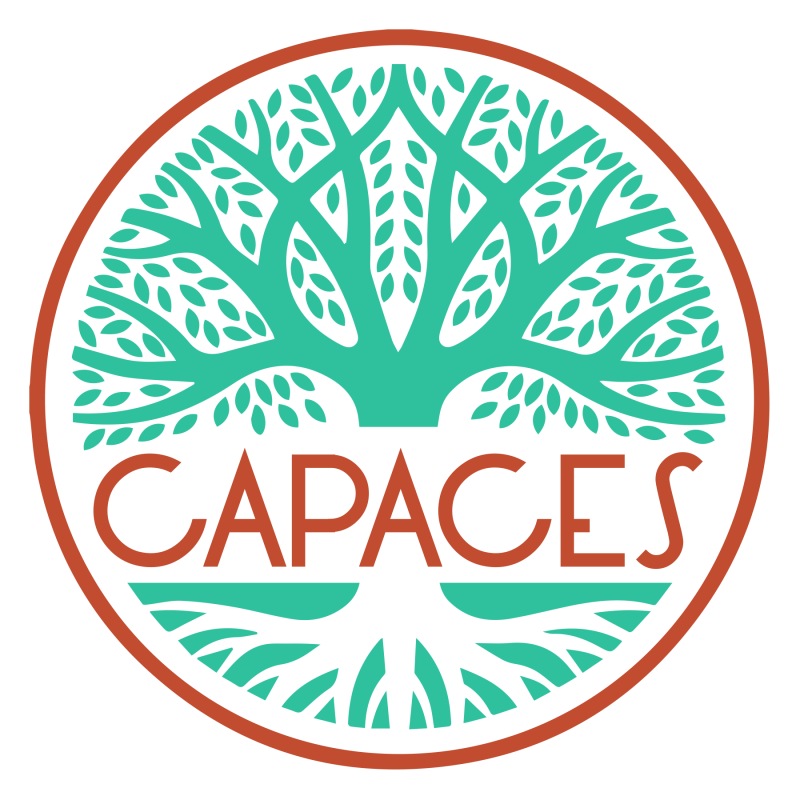Reclaiming Our Own Power Through Moles, Murales y
la Madre Tierra
La abundancia que tenemos:
Stories of youth leadership and community-based summer learning in the TURNO and Anahuac programs at Capaces Leadership Institute
by Daisy Santana and Sofia Baum
Daisy Santana is the TURNO Program Manager at Capaces Leadership Institute. Sofia Baum is the Anahuac Program Support Specialist at Capaces Leadership Institute.
Photographers:
Yvanna Ramos
Simon Baum
Editors:
Eduardo J. Serrano
Louis Wheatley
“Gracias por venir. Vamos a hacer un círculo, por favor.”
“Thank you for coming. Let’s make a circle, please.”
Toddlers, teenagers, and families stepped off the bus among the trees at Silver Falls State Park, backpacks and jackets in hand. The sounds of kids’ voices buzz in the air, ready for the activities of the day. Parents and children hold hands as they make their way to the grassy lawn. Gradually, everyone gathers under the shaded tree and sits down on the ground, coming together in the large circle.
Breathe in, breathe out.
Slow down. Amid the chaos, we want to be fully present: “Parar el mitote,” we say. We smell the grass beneath our bodies in the middle of the forest. We are in community with one another, all at the same level, sitting softly with la Madre Tierra, our Mother Earth. Just being… Just existing. Truly slowing down and practicing the silence, together. We are here to reconnect with our ancestral relationship to nature, and with each other.
Breathe in, breathe out.
As the circle begins to form, the two of us join in. We are Daisy Santana, TURNO Program Manager, and Sofia Baum, Anahuac Program Support Specialist, at Capaces Leadership Institute in Woodburn, Oregon. Both of us joined the Capaces team this past spring, and at the same time joined a movement that has lived longer than either of us have been alive.
Capaces just celebrated its tenth anniversary this summer, a milestone for our work as part of Oregon’s Immigrant and Farmworker Rights Movement, which began in 1977. Our organization grew out of a collective need and effort to take care of one another, focus on wellness, cultivate our leadership potential, and see each other as whole people. Our gente—our people—are on the frontlines of the movement, and burnout is a risk in any shared fight for equity. Capaces is a place where our gente—Latinx and Indigenous ethnic groups from Mexico, Central America, and South America who now live and work in Oregon’s Willamette Valley—can come to be in community with one another, support each other’s leadership, preserve and practice our traditions, and celebrate our strides over delicious food and storytelling.
Capaces makes a special point to support the well-being of youth and families. The Talento Universitario Regresando a Nuestros Orígenes (TURNO) program, or University Talent Returning to Our Origins, creates a path for high school-aged Latinx, immigrant, Indigenous, and farmworker youth to embrace and prepare for long-term leadership through self-discovery, community-based service, support for academic success, and workforce development. The Anahuac program offers our youth and community the opportunity to learn and practice traditional ways of life in agriculture, culinary and cultural arts, wellness, and Indigenous languages such as Mixteco and Zapoteco. Our mission is to support our community to reclaim our ancestral culture, traditions, knowledge, and values, restoring our sacred relationships with all life and la Madre Tierra for generations to come.
After a very challenging year during which our community faced a pandemic, wildfires, an ice storm, anti-immigrant hatred, breakdowns in democracy, and a transition to a new presidential administration, this past summer was an important time for our community to reconnect, ground ourselves in our ancestral knowledge, and remember and celebrate who we are. Our partners at the Salem-Keizer Coalition for Equality (SKCE) approached the TURNO and Anahuac programs to host youth and families from the Willamette Valley for a series of weekly talleres de verano, or summer workshops, that reclaim our ancestral practices of reciprocity through the exchange of stories, knowledge, and traditions.
At the beginning of each taller, we gathered with the youth and families in a circle, a sacred symbol for Indigenous communities all over the world. Everything is circular: life and death, seasons, daylight to nightfall, and so on. We embody the imagery of a spiral until we come to our center, the essence of who we truly are. Together, we take this time to parar el mitote, or silence the mitote—an act of calming the noise or fog in our minds to fully experience the reality of how interconnected we are with all life when we live from our hearts.. Once in this state of humbled being, we are aware of our inner selves and our participation in this profound coexistence with one another and all life.
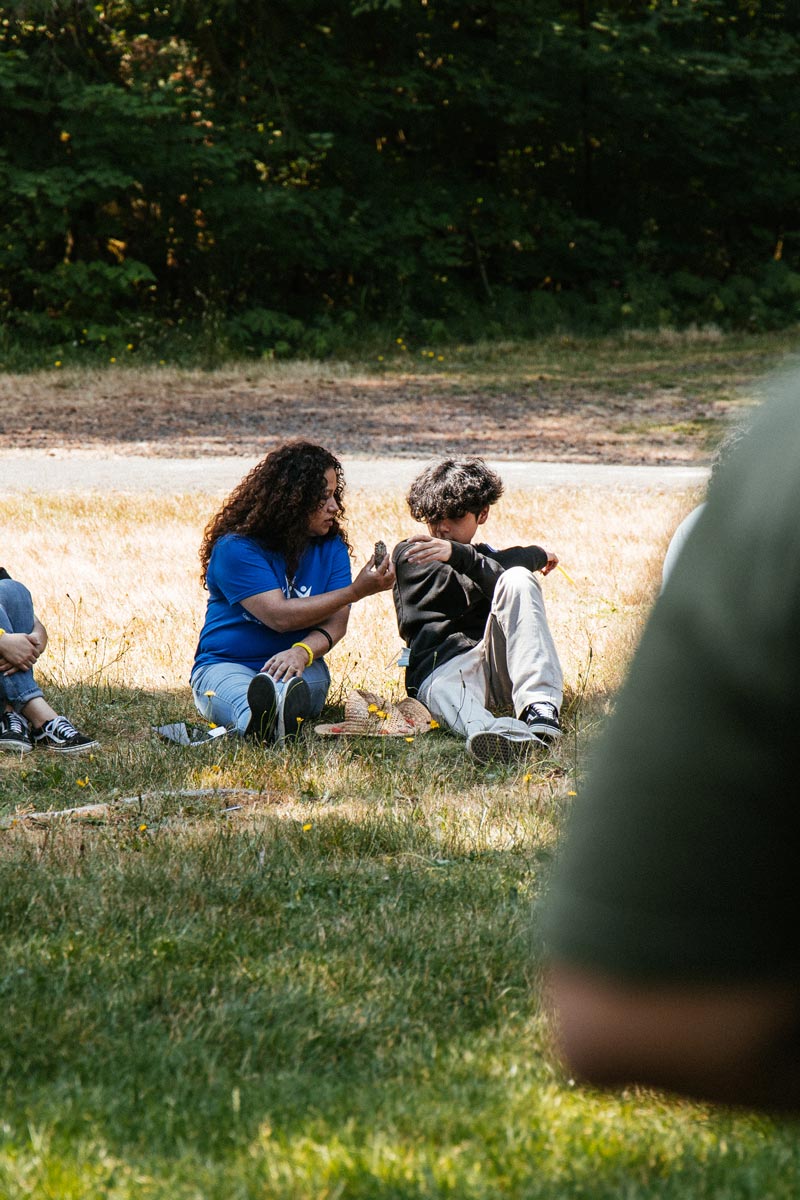
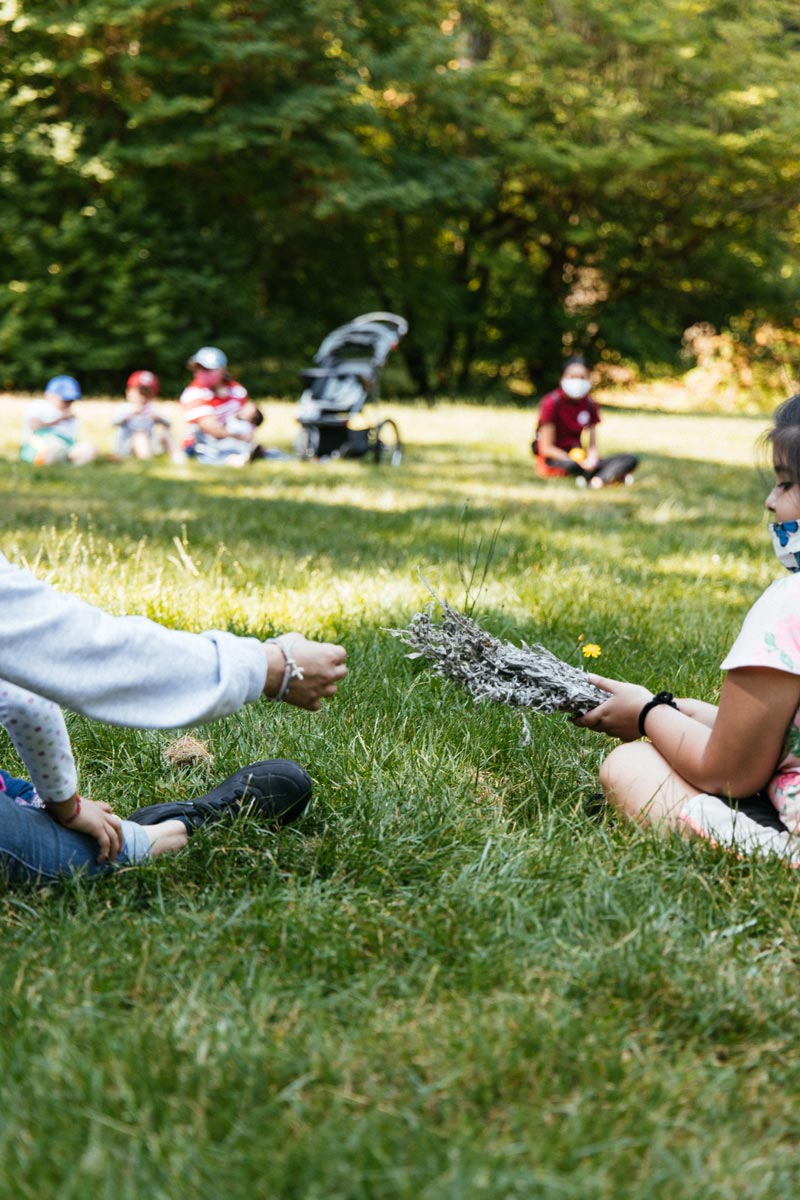
Don Javier Lara, the Anahuac Program Manager at Capaces, pulls the bundle of sweet cedar, feathers, and sage from a paper bag. Though we cannot burn the sage today due to the drought and burn ban, we still follow the movement of traditional smudging—passing along the bundle of sage as we each sweep its essence over our chest and head, along our arms and legs, and behind our backs. This cleansing practice is followed by seven minutes of silence to parar el mitote and let all things that are not real fade away.
After the silence, Don Javier brings us back into the circle. We each receive the cedar from our right and pass it to our left, breaking off a piece to make our ofrenda—our offering—to the waterfalls. The waterfall is a sacred symbol for Mixtecs and other Indigenous communities from Central and South America, and our ofrenda is a token of our respect and gratitude for this encounter. Don Javier then raises the feathers. “Ahora vamos a pasar las plumas y compartir una historia de su corazón o como se sienta,” he says, inviting each of us to share stories and sentiments from the heart as the feathers go around the circle.
The feathers make their way to Estrella Tapia, a youth leader in the Anahuac program.
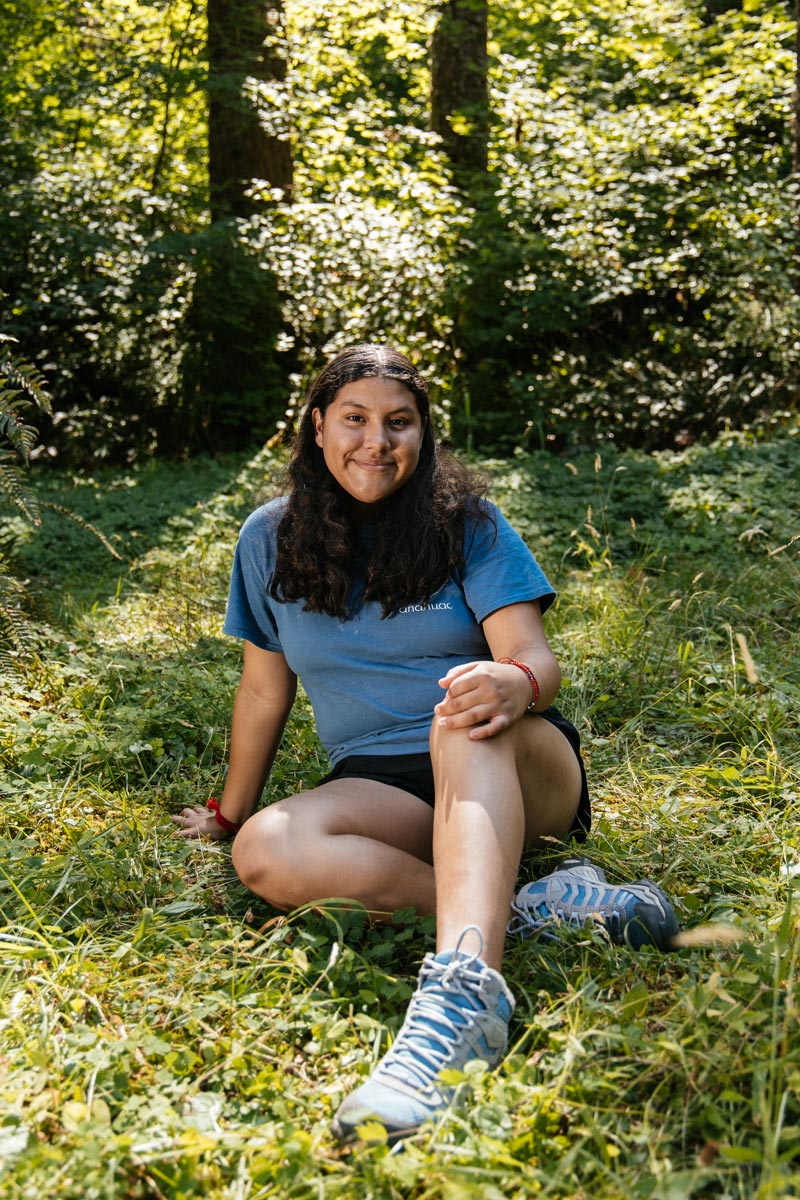
La cosa más importante que he aprendido aquí en Anáhuac ha sido los valores que hacen ‘tequio’ y ayudan a las personas. [The most important thing I have learned here with Anahuac has been the values of practicing ‘tequio’ and helping people.]
It might not seem like you’re doing something or you’re not getting something in return, but you’re always going to feel good. You’re always going to feel good helping people, you’re always going to feel good giving back, and that’s the most important thing I’ve learned in Anahuac.
– Estrella Tapia
Tequio—or tequitl in the Nahuatl language—means to practice our Indigenous customs of work or labor in service of the community. It echoes our core values at Anahuac, such as collectivism, goodness, balance, and reciprocity. We strive for our work to always be about helping each other to grow stronger—putting aside labels, anything owed, or keeping track.
In the spirit of tequio, we did not lead the Capaces summer talleres alone. We were supported by six young women—Diana, Aide, Neida, Estrella, Adabella, and Karina—who were among the cohort of middle school, high school, and recently graduated youth leaders in TURNO and Anahuac who helped lead our workshops for youth and families from the Salem-Keizer Coalition for Equality. Along with our community’s matriarchs, we needed our youth to help us deliver the best talleres possible: a culinary workshop teaching how to make traditional mole; an excursion to Silver Falls State Park to reconnect with la Madre Tierra and learn about native plants; and a collaborative arts workshop where we designed and painted a culturally powerful mural together.
Even in the midst of so many unknowns during the pandemic, our youth leaders were open, flexible, coachable, and team players. Capaces had invested in these young leaders for years through our TURNO and Anahuac programs, and we watched them grow into their leadership roles during this summer’s talleres. They flourished when engaging with youth and families from the Salem-Keizer Coalition for Equality, teaching games like gallitos, navigating the forest, helping with childcare, or showing how to glide a paintbrush or grind mole paste in the metate.
It is profound for these young women—some who identify as Mexican-American, some as immigrants, all children of farmworkers with ancestral roots across the Americas—to be in a loving and accepting space to explore their identity with openness: fully and completely accepting who they are. Exposing them to the richness of their culture, their ancestry, this wealth of what we have. Letting them make their own choices in where they want to go with that knowledge, never pushing them with our own agenda. A freedom to be who they truly want to be.
Capaces planted a seed, and this summer we saw the fruto de nuestro trabajo—the fruit of our labor. Diana, Aide, Neida, Estrella, Adabella, and Karina have taken their experiences with Anahuac and TURNO deep into their hearts and have invested themselves in sharing these ancestral ways with an even younger generation. At the talleres de verano, these young women embodied the importance of believing in, celebrating, investing in, and uplifting youth to use their voices and grow into their own power.
La reciprocidad—reciprocity—is one of our most closely held values at Anahuac. We define it as carrying mutual respect in our hearts for all life by practicing exchange and giving back for what is received. This value is present in our work in Capaces as well as our summer workshops, not only with the families we hosted, but also with the young TURNO and Anahuac leaders who share their stories in this circle.
The feathers are passed from mother to child, around the circle, and find themselves in the hands of Diana.
Me siento conectada con mis antepasados cuando estoy en TURNO y Anáhuac porque todas las cosas que hacemos y las historias de las personas me hacen recordar a ellos y nunca lo puedo olvidar.
[I feel connected with my ancestors when I’m with TURNO and Anahuac because of everything we do and people’s stories make me think of them, and I can never forget it.]
– Diana Bonifacio Herrera
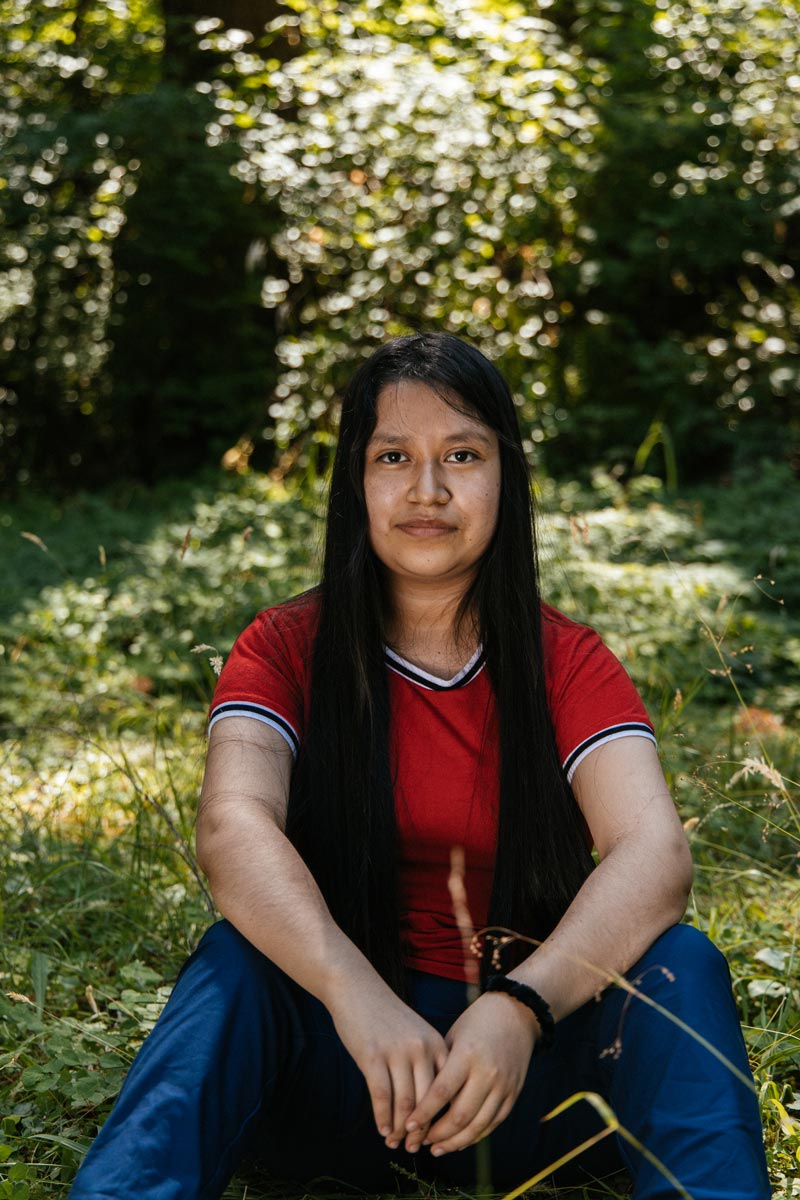
As we gaze around our community circle every week, we reflect on how the summer talleres reconnected our members of our community to each other, and to the wisdom and traditions that connect us to our ancestors over centuries of prosperity and struggle. The mole workshops focused on our relationship with the milpa—corn, squash, and beans—that were originally cultivated from our ancestral communities. Don Javier shared how we can change our way of seeing the milpa, quelites, and chiles as part of a bigger whole, and as an art. These plants come together to make something as beautiful as mole, something that is appreciated all over the world. Using ancestral techniques, we made mole the way our ancestors did: using firewood in a fogón—similar to a hearth—instead of a stove, using our hands to take the seeds out of the chiles, using the molino de mano—a hand mill—to grind the ingredients, using the metate—a mealing stone—to grind the paste. Families could learn how to make six different types of moles from scratch: mole verde, mole negro, mole amarillo, pipián, mole picoso, and mole dulce.
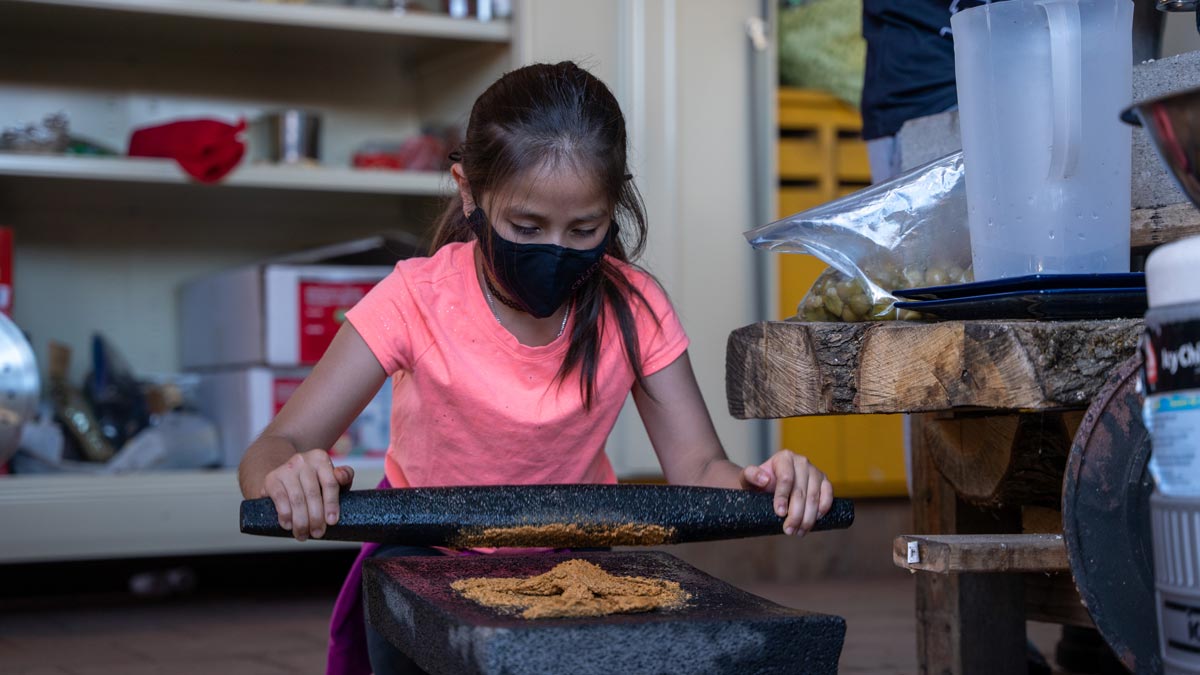
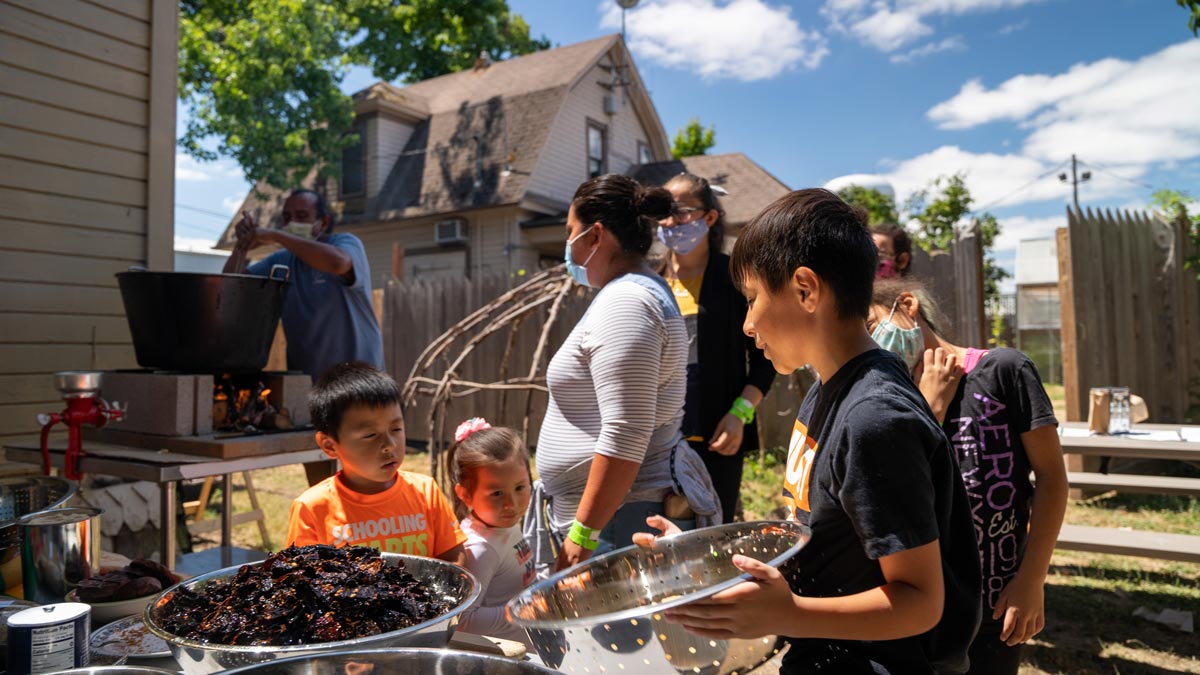
At Silver Falls State Park, our talleres centered our ancestral relationship to the natural world, remembering that we have a deep, deep relationship to our Madre Tierra. In the morning, youth and families made their ofrendas to the waterfall, each taking a deep breath before scattering their aromatic handful of cedar and sage into the crashing cascada. It was a thank you to life, to the beauty, to the forest for allowing us to be there. As we transitioned to lunch, the scent of the ofrenda lingered in our hands as we ate tortas, and watched the TURNO and Anahuac youth teach families about ecological practices like recycling and water conservation. In the afternoon, we laughed during a friendly native plant identification competition, searching for plants such as red huckleberries, Oregon grape, and wild ginger along the Howard Creek Horse Camp Trail. Holding a deep relationship with the plant world and harvesting native plants for food and medicine is a practice that has been long carried out by our ancestors. To return to the forest in this way reawakens this relationship that has lived for generation upon generation before us that we now carry within us. Being in the forest allows us to release the weight of the world we carry on our shoulders. Pause, breathe, be in our bodies.
We wrapped up our series of talleres by painting a powerful mural at Capaces’ headquarters with Salem artist Eduardo Diaz-Salazar, also known as Eddie Caine, and making papalotes—kites—with Señora Lupita and Señora Lorena, two of the mamás in our community, our matriarchs. These were beautiful opportunities to engage both children and parents in art and symbols connected directly to our culture, bringing out the creativity of our community.
Music lifted everyone’s spirits, the energy flowed as we collaborated on a mural incorporating sacred symbols from our community, like the Quetzalcóatl, that remind us where we come from. Talking, singing, dancing, joking, and painting, it felt like a family gathering. There were moments of decision-making, taking a step back to look at our work. Seeing the faces of the mamás and the children express their sense of pride and accomplishment was the ideal culmination of Capaces’ summer programming.
Next to Diana is her friend and fellow teammate Karina. Karina accepts the feathers from Diana.
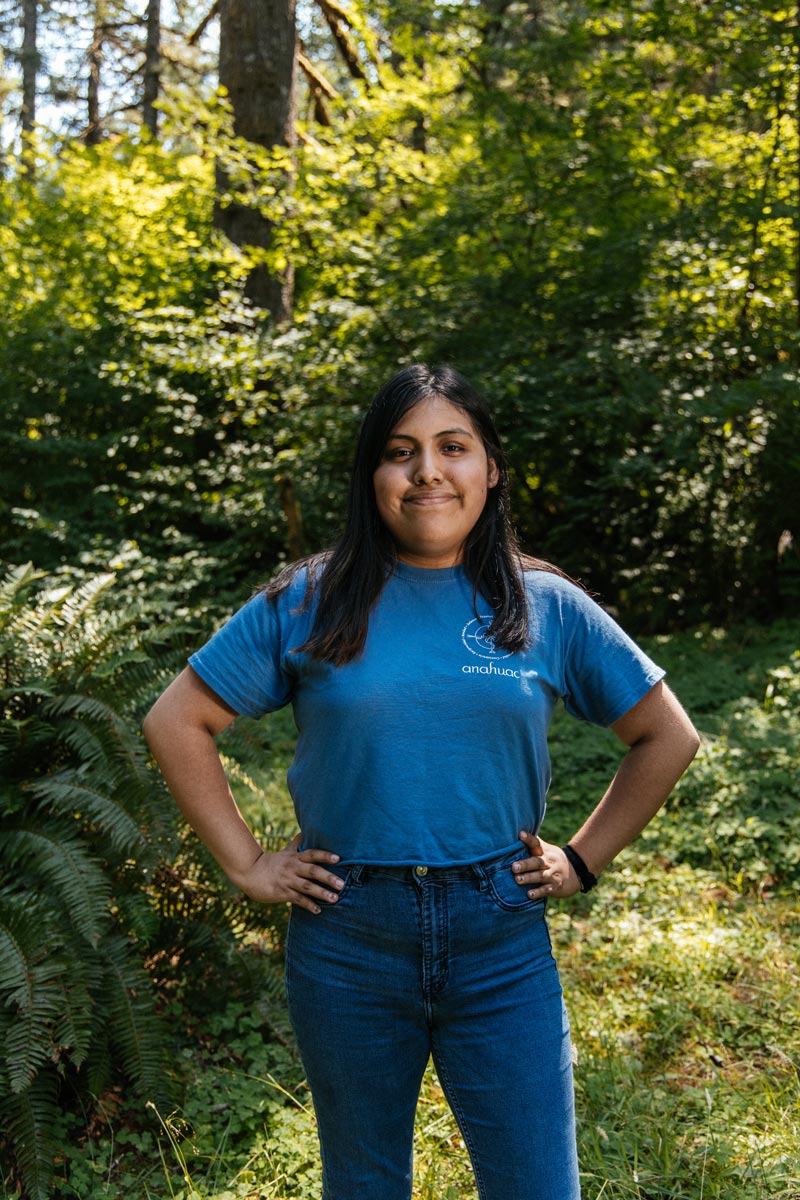
Al trabajar con Anáhuac, he tenido oportunidades de ayudar a las generaciones más pequeñas. Yo me veo reflejada en ellos cada vez que tengo esta oportunidad. Me siento muy orgullosa de poder ayudar, y a no perder nuestras raíces en ellos.
[Working with Anahuac, I’ve had opportunities to help younger generations. I see my reflection in them every time I have this opportunity. I feel very proud to be able to help, and to not lose our roots in them.]
-Karina León-Ramírez
During one of our circles at Silver Falls State Park, a mother from the Salem-Keizer Coalition for Equality is inspired by Karina’s story. With the feathers in her hands, she shares memories of how her grandparents and community in Mexico would get together before planting frijol—beans, calabaza—squash, and maíz—corn. Her grandfather led a ceremony to ask for a good harvest, and it would always rain when they went out to the field. During harvest season, all of the community would share the bounty. Even those who didn’t have a good harvest that year would go home with food for their families. This story, which feels so far removed from her current reality, was brought to the forefront of her memory for the first time since childhood, in this place, in our circle, under the trees at Silver Falls. It’s the first time she is sharing this story with her own children.
The feathers are halfway through the circle now. They are placed in the hands of Aide.
The most important thing I’ve learned from Anahuac is continuing to learn our ancestral practices, passing it on to future generations, and not letting our ancestral practices fade. That we continue to build off what we’ve learned here and teach our future generations.
– Aide Robles Rodriguez
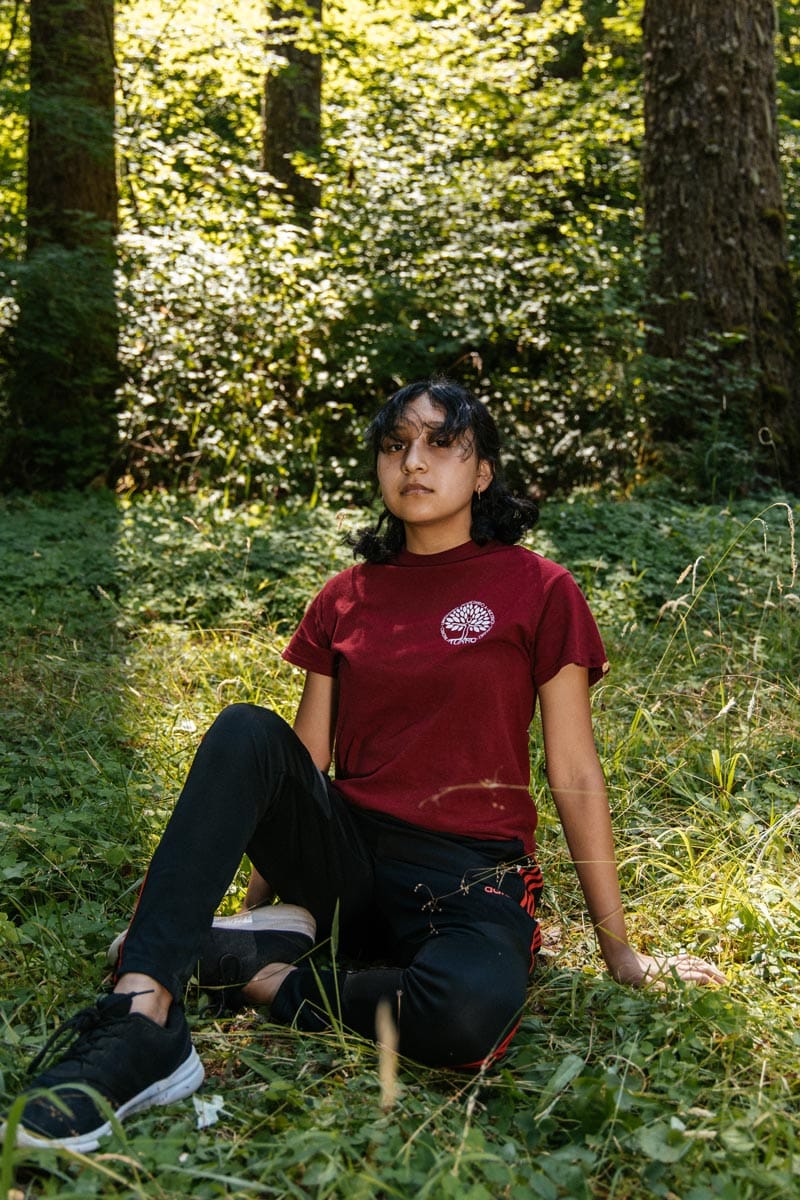
Aide hands me, Sofia, the feathers.
I twirl the feathers in between my fingers, admiring the variety of their colors and patterns. Over the years, each feather has been picked up by a youth or parent and given to Anahuac as a gift for the collective bundle. How beautiful it is that I am here now, sitting in this circle, soaking in the stories and sharing my own in my broken Spanish. I’ve been looking for these types of connections, this type of work for a long time. Fulfilling, challenging in the best of ways, and where I am a student too, learning alongside the youth. A place where I can bring my own experiences and express myself without judgement.
Being immersed in this environment at Capaces today brings me back to a conversation I once had with Larry Kleinman, one of the elders of the movement for Immigrant and Farmworker Rights in Oregon. He told me: “The movement gives back to you.” It allows us to grow into our own strengths, overcome our own insecurities, and become dense with our own reclaimed power.
The feathers go on, making their way to Adabella.
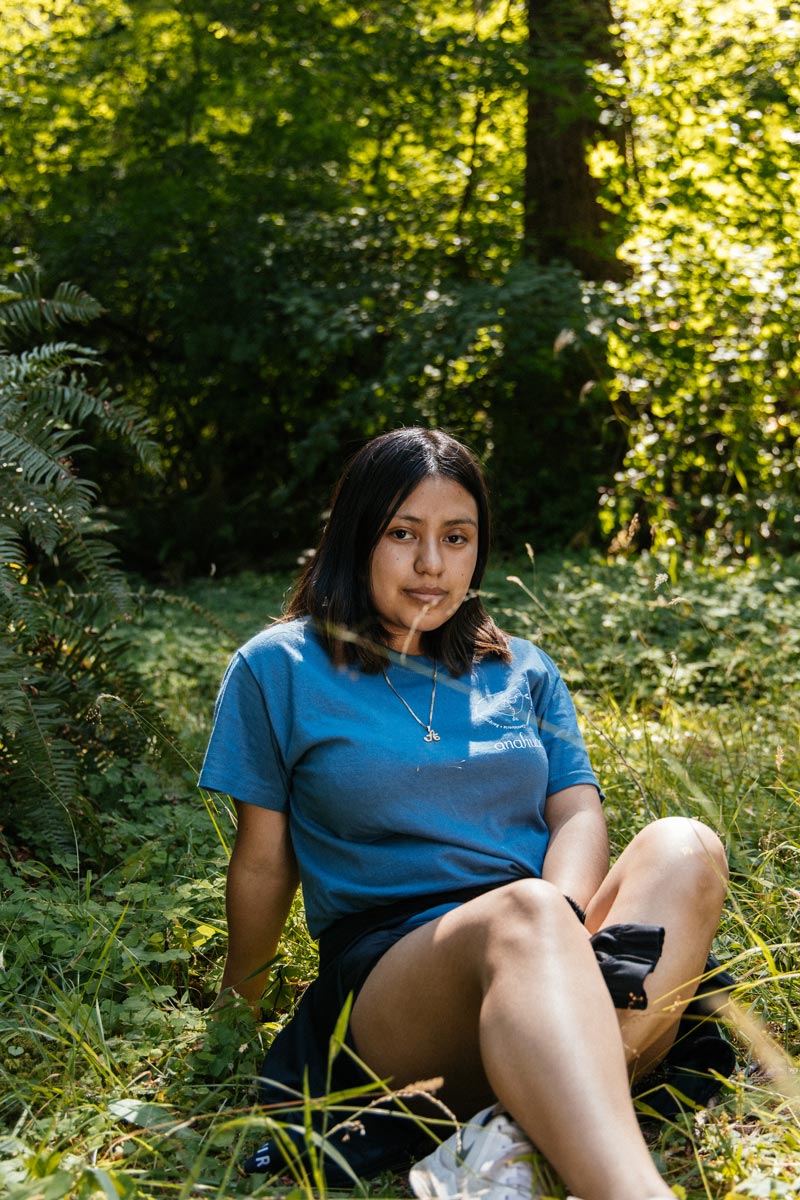
Yo me siento cómoda con otras personas que son de mi misma raíz porque podemos compartir cosas que cada uno sabe de su cultura o que ha pasado. Cuando estamos juntos somos como una familia.
[I feel comfortable with other people who share the same roots as me because we can share things that each of us knows about our culture or all that’s happened. When we’re together, we’re like a family.]
-Adabella Bonifacio Herrera
Adabella hands me, Daisy, the feathers.
Working with our community to lead Capaces’ summer programming has been an incredible experience. As an immigrant, I have always carried with me a hole in my heart. Missing home, missing family, missing the simplest things, like the taste of my mom’s handmade tortillas or the smell of firewood and tierra mojada—similar to the smell of recent rain after a prolonged drought. I thought I came into this role with TURNO to support and serve youth, but I never imagined how much I would gain, grow, and learn every single day. That hole in my heart seems smaller now. This experience has empowered me to be my authentic self. It gave me the community I was craving since I left my little town in Mexico. It gave me the opportunity to share my stories and experiences and it transported me back home.
At our final taller, our seven minutes to parar el mitote were suspended in complete silence in the air. Sad to know our weekly workshops together were coming to an end, yet still vibrant as we celebrate each other and our accomplishments. There’s a strong feeling of closeness and happiness that we could have this summer experience together. Neida closes our circle.
I think it’s very important that we keep teaching. The most important thing I’ve learned from Anahuac and TURNO is that we have a purpose to keep the traditions alive and pass them on to future generations. Because it seems like some of us don’t know, so it’s important for us to start learning and passing it on.
-Neida Robles Rodriguez
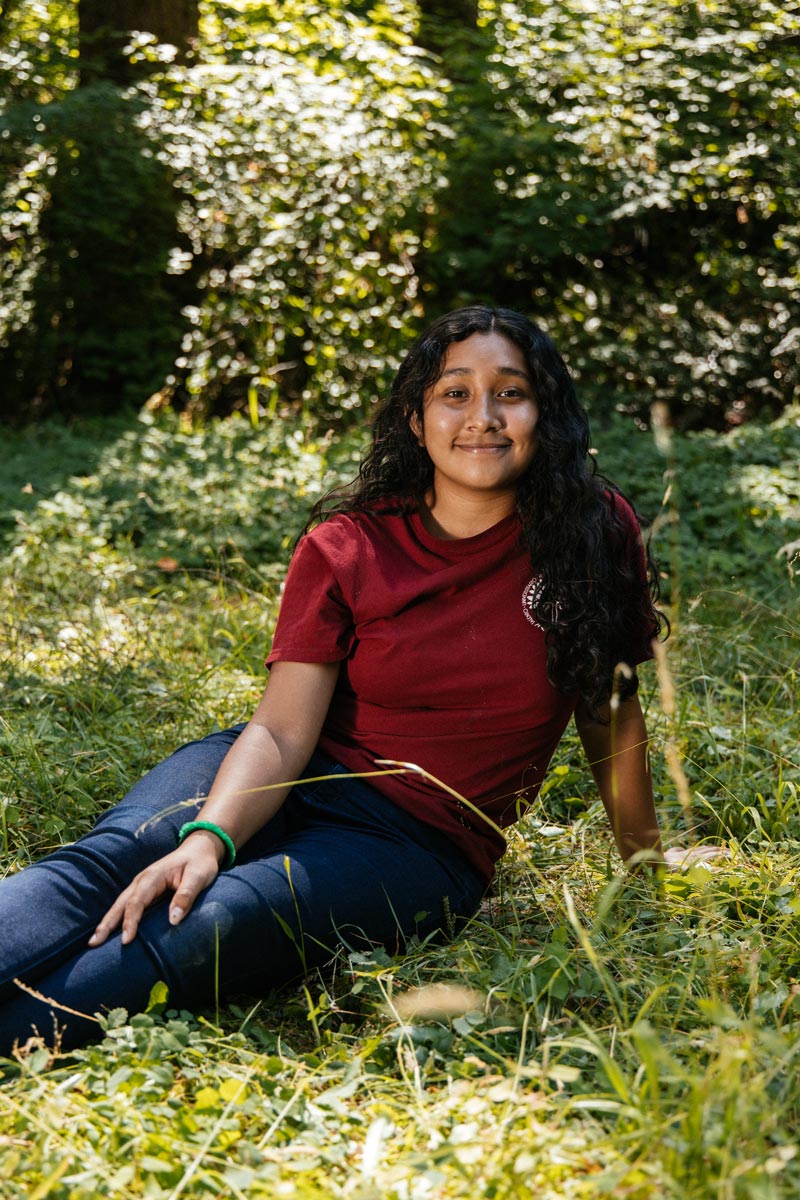
Looking forward, the TURNO and Anahuac Programs are going through their own evolution.
As our name suggests, TURNO is regresando a nuestros orígenes—returning to our roots. We are taking an intentional look at how we cultivate youth leadership, and emphasizing our focus on relationships: our relationship to our ancestors, to our home countries, to one another, to our community, to higher education institutions, to organizations. We are building our foundations and readjusting to the needs of the youth we serve, walking alongside them as they explore the many paths for their futures.
Anahuac is at an exciting moment of expansion as we plan to purchase and access land that we envision becoming a cultural center and farm for our community. We are aligning our everyday work with our vision of a world in which communities are empowered with the freedom of choice, accessibility, and restoration of responsibility to practice the ways of their ancestors to sustain the future of all life.
Our goal, ultimately, is to create an impact in our youth: those participating in the TURNO and Anahuac programs, like Diana, Aide, Neida, Estrella, Adabella, and Karina; and many more in the Willamette Valley, like the youth from the Salem-Keizer Coalition for Equality. To offer them experiences they can look back on and treasure. A new lens to appreciate their parents and grandparents in the abundance of our culture. Planting the seeds that they are a part of something bigger than themselves. There is power and richness in that.
Once the feathers were passed and stories were told, the circle closed with a song by Ángela Romano that symbolizes reciprocity, abundance, and honoring la madre tierra. Singing is the highest vibration, a connection to our ancestry, and an offering wherever we go.
Canten, cantemos / Sing, let’s sing
joy joy joy joy joy (x2)
Y la vida celebremos / And let’s celebrate life
joy joy joy joy joy (x2)
Agradeciendo a la tierra / Thanking the Earth
joy joy joy joy joy (x2)
La abundancia que tenemos / The abundance that we have
joy joy joy joy joy (x2)
Compartiendo, compartiendo / Sharing, sharing
joy joy joy joy joy (x2)
La abundancia que tenemos / The abundance that we have
joy joy joy joy joy
Compartiendo, compartiendo / Sharing, sharing
joy joy joy joy joy
Editor’s note:
Capaces Leadership Institute’s 2021 summer programming was supported by Oregon’s historic $250 million public investment in summer learning and enrichment for youth, including $40 million dedicated to culturally specific community-based programming through grants administered by the Oregon Community Foundation.
This essay was produced in a storytelling partnership between Capaces Leadership Institute and Foundations for a Better Oregon (FBO).
